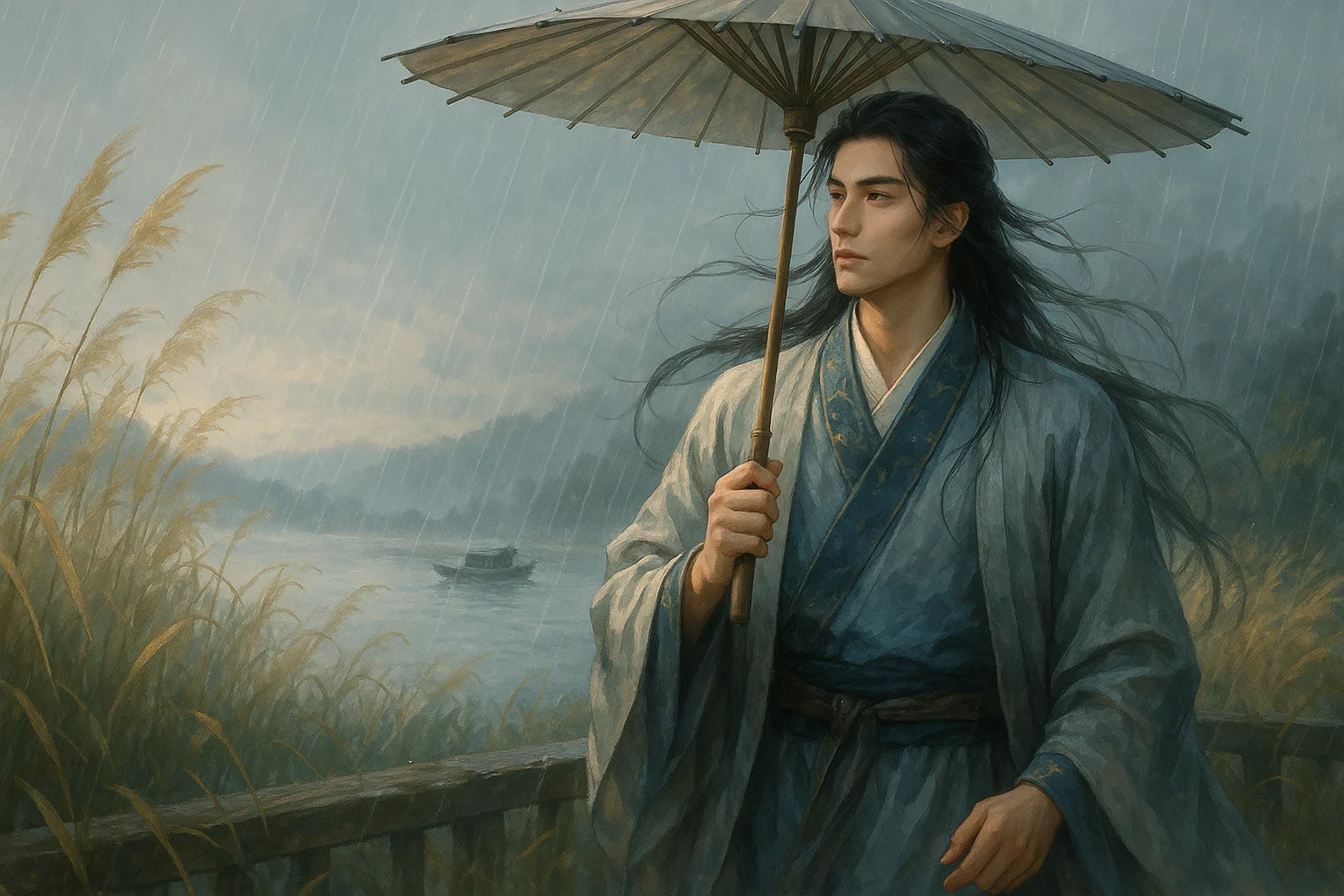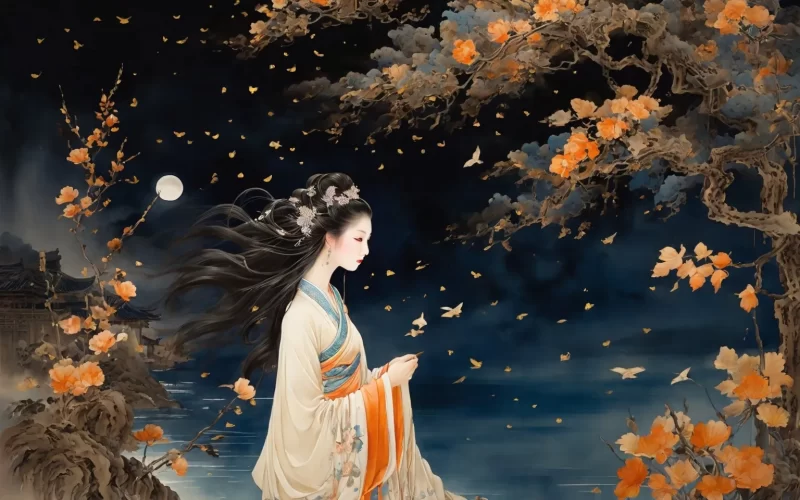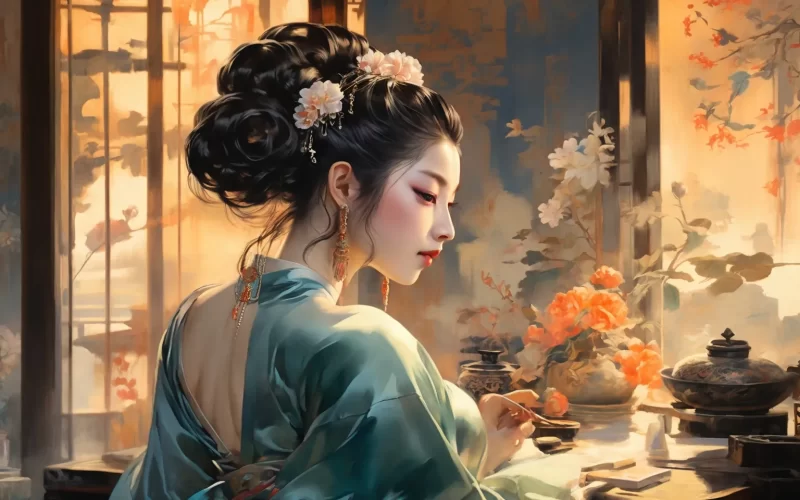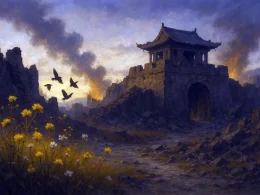There's a harp in the midnight playing clear,
While the west wind rustles a green vine;
There's a low cloud touching the jade-white dew
And an early wildgoose in the River of Stars…
Night in the tall trees clings to dawn;
Light makes folds in the distant hills;
And here on the Huai, by one falling leaf,
I can feel a storm on Lake Tung-t'ing.
Original Poem
「早秋」
许浑
遥夜泛清瑟,西风生翠萝。
残萤栖玉露,早雁拂金河。
高树晓还密,远山晴更多。
淮南一叶下,自觉洞庭波。
Interpretation
This poem was composed by Xu Hun during his travels, inspired by the scenery of early autumn. Late Tang poets often expressed melancholic autumnal sentiments—whether due to wandering or unfulfilled ambitions—finding resonance in the season's desolate beauty, and Xu Hun was no exception. While capturing early autumn's atmosphere, the poem conveys both wistfulness and moments of clarity.
First Couplet: "遥夜泛清瑟,西风生翠萝。"
Yáo yè fàn qīng sè, xī fēng shēng cuì luó.
Through the long night, faint zither notes drift,
West winds stir emerald vines adrift.
The opening lines evoke a vast, cool atmosphere. The "zither notes" symbolize inner melancholy, while the "west winds" signal seasonal change. Though the vines remain green, their rustling hints at summer's end and autumn's approach.
Second Couplet: "残萤栖玉露,早雁拂金河。"
Cán yíng qī yù lù, zǎo yàn fú jīn hé.
Last fireflies rest on dew-lit grass,
Early geese skim the Milky Pass.
"Fading fireflies" and "early geese"—seasonal motifs—paint an autumnal nightscape of quiet solitude. The lingering glow and migratory birds deepen the poem's elegiac tone.
Third Couplet: "高树晓还密,远山晴更多。"
Gāo shù xiǎo hái mì, yuǎn shān qíng gèng duō.
At dawn, tall trees stand thick and high,
Sunlit distant peaks multiply.
Shifting from night to morning, this couplet introduces brightness. Though autumn nears, lush trees and clear mountains offer solace, tempering the earlier melancholy.
Fourth Couplet: "淮南一叶下,自觉洞庭波。"
Huái nán yī yè xià, zì jué dòng tíng bō.
One leaf falls in Huainan's air—
Lake Dongting's waves seem stirred there.
The finale blends allusion and emotion. A single falling leaf heralds autumn, while imagined ripples on distant waters mirror the poet's inner stirrings—a fusion of scene and sentiment that expands the poem's scope.
Holistic Appreciation
Centered on early autumn, the poem begins with chilly night scenes, progresses through vivid seasonal imagery, and concludes with reflective depth. Cold nights, whispering winds, fading fireflies, and migrating geese evoke autumn's solemn beauty, while dawn's sturdy trees and sunlit peaks introduce hopeful contrast. The closing couplet's allusion—where one leaf suggests vast waves—demonstrates the late Tang poets' signature blend of nature observation and philosophical resonance, moving from minute detail to cosmic contemplation.
Artistic Merits
This work exemplifies Xu Hun's landscape poetry: expansive composition, rich imagery, and rhythmic progression. Allusions arise naturally, adding historical depth without artifice. Emotion emerges indirectly through shifting scenery and layered motifs, achieving seamless fusion of feeling and form—a testament to his mastery of subtle expression.
Insights
The poet's sensitivity to season and mood lies not in dramatic strokes but in nuanced observation. While honoring traditional autumnal melancholy, the poem also reveals deeper communion with nature, tracing a path from emotion to insight. In our own lives, we might emulate this attentive gaze—finding in small natural signs (a falling leaf, shifting light) reflections on life's transitions, allowing our feelings to settle and soar through nature's metaphors. Such keen yet tranquil perception, vital to poets, can also guide us in navigating reality and tempering our emotions.
About the poet

Xu Hun (许浑), c. 791 - 858 AD, was a Tang Dynasty poet, a native of Danyang, Jiangsu Province. He was one of the most influential poets of the Late Tang Dynasty. His poems are characterized by nostalgia for ancient times and idyllic poems, in which he describes the scenery of water and rain.











